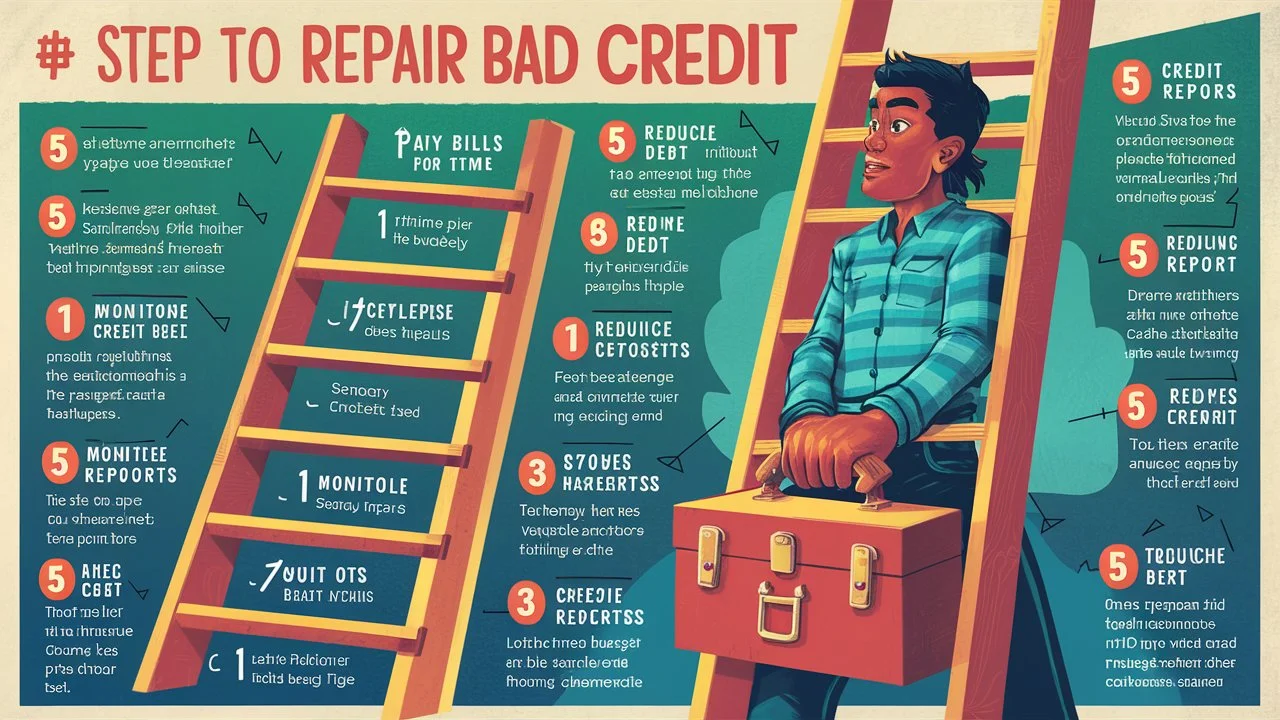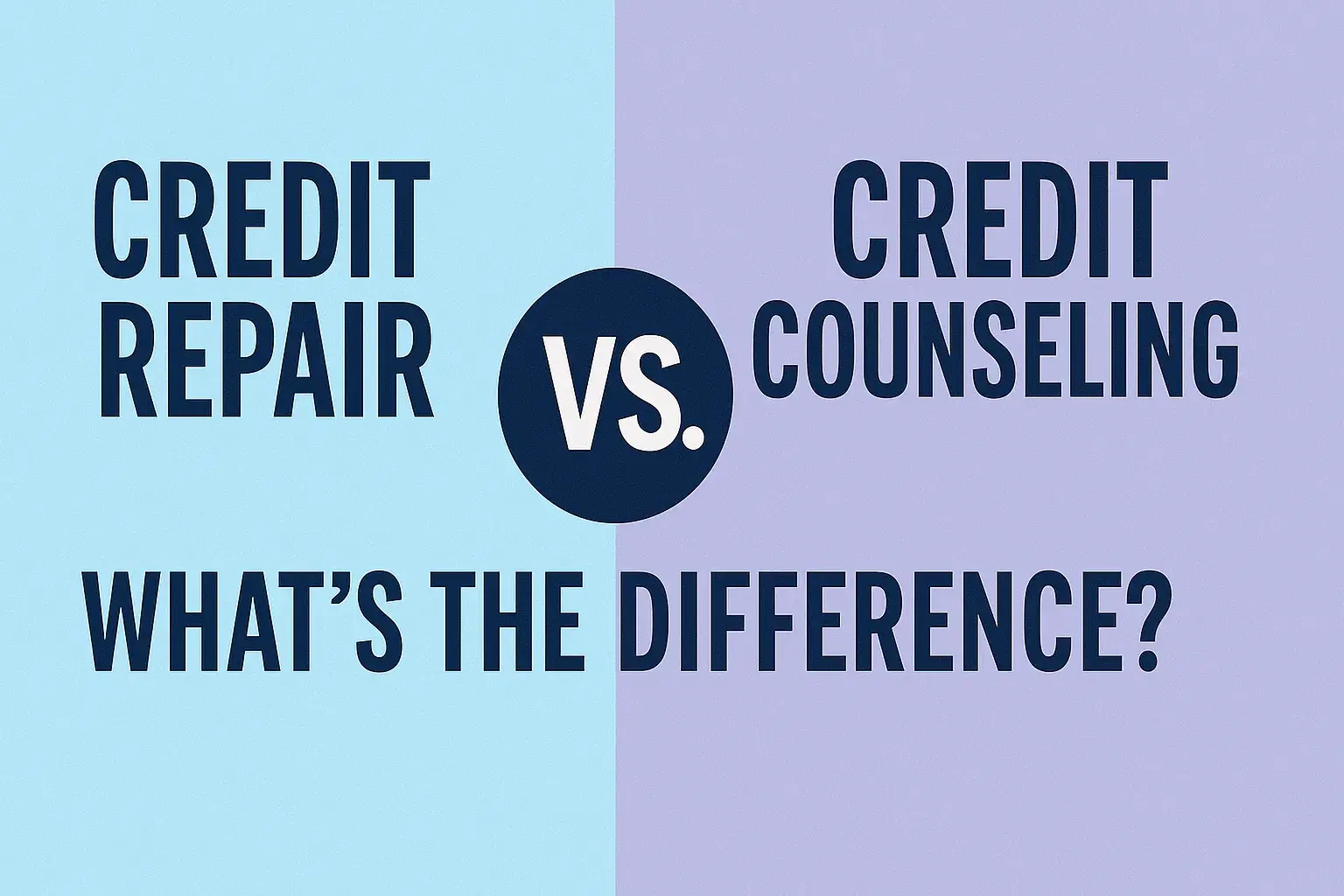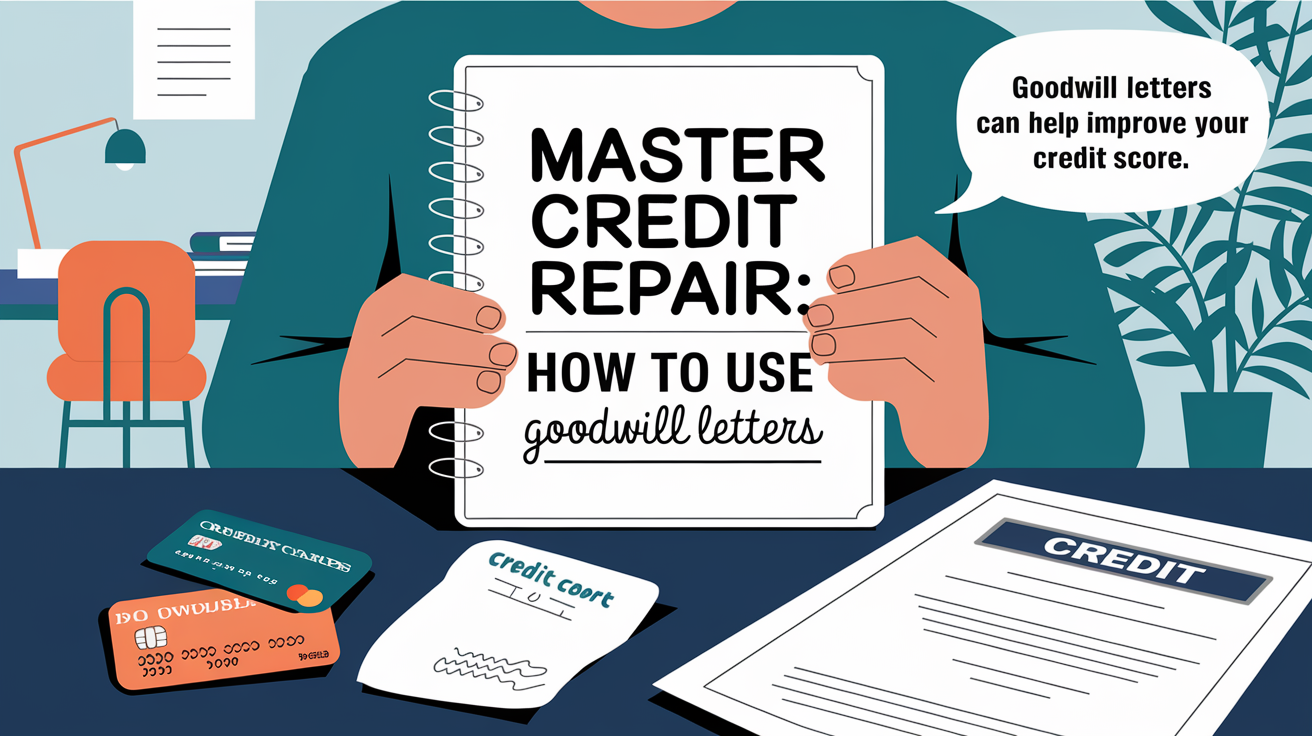How Can I Repair My Bad Credit?

Repairing bad credit can seem daunting, but it's achievable with a strategic approach. This guide provides actionable steps, expert insights, and current 2025 data to help you rebuild your credit score effectively and regain financial confidence.
Understanding Your Credit Score
Your credit score is a three-digit number that lenders use to assess your creditworthiness. It's a snapshot of your financial behavior, reflecting how likely you are to repay borrowed money. In 2025, the most commonly used credit scoring models are FICO and VantageScore, with scores typically ranging from 300 to 850. A higher score indicates lower risk to lenders, making it easier to qualify for loans, mortgages, credit cards, and even rent an apartment. Conversely, a low score can lead to higher interest rates, denied applications, and significant financial hurdles.
The Importance of a Good Credit Score
Having a good credit score (generally considered 670 and above for FICO) opens doors to numerous financial opportunities. It can mean lower interest rates on car loans and mortgages, saving you thousands of dollars over the life of the loan. It can also influence insurance premiums, utility deposits, and even employment prospects in certain industries. In 2025, the financial landscape is increasingly digital, and credit scores are often checked instantaneously, making a strong score more critical than ever for seamless financial transactions and access to favorable terms.
Key Factors Influencing Your Credit Score
Understanding what goes into your credit score is the first step toward improving it. The major components, as per current FICO scoring models in 2025, include:
- Payment History (35%): This is the most critical factor. Making on-time payments for all your credit accounts (credit cards, loans, mortgages) is paramount. Late payments, defaults, and bankruptcies significantly damage your score.
- Amounts Owed (30%): This refers to your credit utilization ratio – the amount of credit you're using compared to your total available credit. Keeping this ratio low, ideally below 30%, is crucial. High utilization suggests you might be overextended.
- Length of Credit History (15%): The longer you've had credit accounts open and in good standing, the better. This shows lenders a consistent history of responsible borrowing.
- Credit Mix (10%): Having a mix of different types of credit, such as revolving credit (credit cards) and installment loans (mortgages, auto loans), can be beneficial. However, this factor is less impactful than payment history or amounts owed.
- New Credit (10%): Opening several new credit accounts in a short period can negatively affect your score, as it may indicate increased risk.
Identifying the Root Causes of Bad Credit
Before you can fix your credit, you need to understand why it's bad. Common culprits include missed payments, high credit card balances, collection accounts, and public records like bankruptcies or judgments. Pinpointing these issues is essential for creating an effective repair strategy.
Reviewing Your Credit Reports
The foundation of credit repair is obtaining and thoroughly reviewing your credit reports from the three major credit bureaus: Equifax, Experian, and TransUnion. In 2025, you are entitled to a free credit report from each bureau annually through AnnualCreditReport.com. Scrutinize each report for inaccuracies, such as incorrect personal information, accounts you don't recognize, or erroneous late payment notations. Even minor errors can negatively impact your score.
Common Reasons for a Low Credit Score
Several common financial behaviors contribute to a poor credit score. Recognizing these in your own financial history is the first step to correction:
- Late or Missed Payments: This is the most damaging factor. Even one late payment can significantly drop your score. Consistent late payments are detrimental.
- High Credit Utilization: Carrying balances close to your credit limits on credit cards signals to lenders that you might be struggling to manage your debt.
- Collection Accounts: Unpaid debts that have been sent to a collection agency are a major red flag.
- Charge-offs: When a lender deems a debt uncollectible and writes it off, it severely impacts your credit.
- Public Records: Bankruptcies, foreclosures, judgments, and liens are serious negative marks that can remain on your report for years.
- Limited Credit History: For individuals new to credit or who haven't used it much, a thin credit file can result in a lower score due to a lack of demonstrated responsible behavior.
- Frequent Applications for Credit: Applying for multiple credit accounts in a short period can lead to numerous hard inquiries, which can lower your score.
Understanding the Impact of Negative Information
Negative information stays on your credit report for a specific period, impacting your score throughout that time. In 2025, the general timelines are:
- Late Payments: 7 years
- Collection Accounts: 7 years from the date of delinquency
- Charge-offs: 7 years from the date of delinquency
- Foreclosures: 7 years
- Bankruptcies: Chapter 7 typically 10 years; Chapter 13 typically 7 years
- Judgments: Varies by state, often 7-10 years, but can be renewed
While these items remain, their impact tends to lessen over time if you demonstrate positive credit behavior.
Building Your Credit Repair Plan
Once you've identified the issues, it's time to create a structured plan. This involves setting realistic goals, prioritizing actions, and establishing a timeline.
Setting Realistic Goals
Credit repair is not an overnight process. Set achievable short-term and long-term goals. For instance, a short-term goal might be to reduce your credit utilization ratio by 10% in three months. A long-term goal could be to increase your credit score by 50 points in a year. Celebrating small victories can help maintain motivation.
Prioritizing Actions
Focus on the factors that have the most significant impact on your score. This means prioritizing:
- Paying bills on time: This is non-negotiable.
- Reducing credit utilization: Aim to pay down credit card balances.
- Addressing collection accounts: Develop a strategy for these.
The order of operations can vary slightly depending on your specific situation, but these are universally critical.
Creating a Budget
A sound budget is the backbone of any successful credit repair journey. It helps you understand where your money is going, identify areas for savings, and allocate funds towards debt repayment. In 2025, budgeting apps and online tools can simplify this process. A well-managed budget ensures you can consistently meet your financial obligations, including debt payments.
Sample Budgeting Framework
Consider a zero-based budget where every dollar is assigned a job. This involves tracking income and expenses meticulously. Prioritize needs over wants and identify discretionary spending that can be redirected towards debt reduction.
Effective Strategies for Credit Repair
This section delves into the practical, actionable steps you can take to improve your credit score.
1. Pay All Bills On Time, Every Time
This is the cornerstone of good credit. Set up automatic payments or reminders for all your bills, including credit cards, loans, utilities, and rent. Even a single late payment can drop your score significantly. If you've missed a payment, catch up immediately and ensure future payments are punctual.
2. Reduce Your Credit Utilization Ratio
Your credit utilization ratio (CUR) is the amount of credit you're using divided by your total available credit. Lenders prefer to see this ratio below 30%. For example, if you have a credit card with a $10,000 limit and a $5,000 balance, your CUR is 50%. Paying down balances is key. Aim to keep balances low on all your credit cards. Consider paying down balances strategically, focusing on cards with the highest utilization first.
Calculating Your Credit Utilization Ratio
CUR = (Total Balances on Revolving Credit) / (Total Credit Limits on Revolving Credit) * 100
Example: If you have two cards: Card A ($2,000 balance, $5,000 limit) and Card B ($3,000 balance, $10,000 limit).
Total Balance = $2,000 + $3,000 = $5,000
Total Credit Limit = $5,000 + $10,000 = $15,000
CUR = ($5,000 / $15,000) * 100 = 33.3%
3. Negotiate with Creditors and Collection Agencies
If you have past-due accounts or debts in collections, contact the creditors or agencies. You might be able to negotiate a payment plan, a settlement for less than the full amount owed, or a "pay-for-delete" agreement (where they agree to remove the negative mark from your report in exchange for payment). Always get any agreement in writing before making a payment.
Settlement vs. Full Payment
Settling a debt for less than the full amount can still be reported as a negative mark (e.g., "settled for less than full balance"), but it's often better than an unpaid collection account. A full payment is always ideal, but sometimes not feasible.
4. Consider a Secured Credit Card
Secured credit cards require a cash deposit that usually equals your credit limit. They are designed for individuals with poor or no credit history. By using a secured card responsibly (making on-time payments and keeping utilization low), you can build a positive payment history. Many issuers report to the credit bureaus, helping you establish or rebuild credit. In 2025, secured cards remain a popular and effective tool for credit building.
5. Become an Authorized User
If you have a trusted friend or family member with excellent credit, they can add you as an authorized user to one of their credit cards. This allows you to have a card with their account's history reflected on your credit report. However, if the primary cardholder mismanages the account, it can negatively impact your credit too. Ensure the primary user has a strong credit history and low utilization.
6. Credit-Builder Loans
These are small loans specifically designed to help people build or repair credit. You make payments on the loan, but the borrowed amount is held in an account by the lender and released to you after you've paid it off. The lender reports your payment history to the credit bureaus. These are excellent for establishing a positive installment loan history.
7. Dispute Errors on Your Credit Report
As mentioned, errors can happen. If you find any inaccuracies, dispute them with the credit bureau that issued the report and the creditor that provided the information. This is a crucial step and is often the quickest way to remove incorrect negative information.
8. Avoid Closing Old, Unused Credit Cards (with caution)
Closing an old credit card can reduce your average age of credit and decrease your total available credit, potentially increasing your credit utilization ratio. If the card has no annual fee and you can resist the temptation to overspend, keeping it open and in good standing can be beneficial for your credit score. However, if it has a high annual fee or encourages overspending, closing it might be the better choice.
9. Be Patient and Consistent
Credit repair takes time. There are no quick fixes that are legitimate. Focus on consistent, positive financial habits. The longer you maintain good credit practices, the more your score will improve. Most negative items are removed after 7-10 years, but a consistently good history can outweigh them much sooner.
Dealing with Errors on Your Credit Report
Inaccurate information on your credit report can significantly drag down your score. It's vital to know how to identify and correct these errors.
Types of Errors to Look For
Common errors include:
- Incorrect personal information (name, address, Social Security number)
- Accounts that don't belong to you
- Incorrectly reported late payments or missed payments
- Accounts that are reported as open when they are closed, or vice versa
- Incorrect balances or credit limits
- Duplicate accounts
The Dispute Process
The Fair Credit Reporting Act (FCRA) gives you the right to dispute any information on your credit report that you believe is inaccurate. The process generally involves:
- Gathering Evidence: Collect documentation that supports your claim (e.g., proof of payment, account statements, letters from creditors).
- Writing a Dispute Letter: Send a clear, concise letter to the credit bureau (Equifax, Experian, or TransUnion) detailing the error and providing your evidence. You can usually find templates online or on the credit bureau's website.
- Submitting the Dispute: Mail your letter and copies of your evidence to the credit bureau. Keep a copy of everything for your records.
- Bureau Investigation: The credit bureau has 30 days (sometimes extended to 45) to investigate your dispute. They will contact the furnisher of the information (the creditor) for verification.
- Resolution: If the investigation finds the information is inaccurate, it must be corrected or removed from your report. You will be notified of the outcome.
If the credit bureau does not resolve the issue satisfactorily, you can also file a dispute directly with the furnisher of the information.
What if the Error Isn't Removed?
If the credit bureau or furnisher fails to correct or remove the inaccurate information after investigation, you may have further recourse. This could involve filing a complaint with the Consumer Financial Protection Bureau (CFPB) or seeking legal advice. In some cases, a "pay-for-delete" agreement with a collection agency might be an option, though these are not guaranteed and should be handled with caution.
Preventing Future Credit Problems
Once you've repaired your credit, maintaining it is crucial. This involves ongoing responsible financial habits.
Maintaining a Balanced Budget
A budget isn't just for repair; it's for ongoing financial health. Regularly review your budget to ensure you're living within your means and can comfortably handle your financial obligations. This prevents the accumulation of debt that can lead to future credit issues.
Responsible Use of Credit
Use credit cards wisely. Avoid maxing them out, and always aim to pay more than the minimum balance. Treat credit as a tool to be managed, not as free money. For installment loans, ensure you can afford the monthly payments before taking them out.
Regular credit monitoring
Continue to monitor your credit reports periodically. This helps you catch any new errors or fraudulent activity quickly. Many services offer free credit monitoring, or you can continue to use your annual free reports from AnnualCreditReport.com.
Building an Emergency Fund
An emergency fund is vital for preventing reliance on credit cards during unexpected financial emergencies. Aim to save 3-6 months of living expenses. This fund can cover job loss, medical bills, or major repairs without derailing your credit.
When to Seek Professional Help
While many aspects of credit repair can be handled independently, there are times when professional assistance is beneficial.
Credit Counseling Agencies
Non-profit credit counseling agencies can offer valuable advice, help you create a budget, and sometimes negotiate with creditors on your behalf. They often provide debt management plans (DMPs) where you make one monthly payment to the agency, which then distributes it to your creditors. Be sure to choose an agency accredited by the International Association of Credit Counselors and Debt Management Companies (IACCDMC) or the National Foundation for Credit Counseling (NFCC).
Credit Repair Organizations (CROs)
CROs can help you dispute errors on your credit report and negotiate with creditors. However, be cautious. The Credit Repair Organizations Act of 2003 places strict regulations on these companies. They cannot charge you fees before they perform services, and they must provide you with a contract detailing their services and fees. Always research a CRO thoroughly and understand their fees and guarantees before signing up. Legitimate CROs will not promise to remove accurate negative information or guarantee a specific credit score increase.
When to Be Wary
Be skeptical of any company that:
- Guarantees to remove accurate negative information from your credit report.
- Promises to create a new credit identity for you.
- Asks for payment before any services are rendered.
- Charges exorbitant fees for simple tasks you can do yourself.
In 2025, the landscape of credit repair is still subject to these regulations. Always prioritize reputable, transparent services.
Legal Assistance
If you are facing severe financial distress, such as overwhelming debt, potential bankruptcy, or aggressive collection actions, consulting with a bankruptcy attorney or a consumer protection lawyer might be necessary. They can provide legal guidance tailored to your specific situation.
In conclusion, repairing bad credit is a journey that requires patience, discipline, and a strategic approach. By understanding the factors that influence your credit score, identifying the root causes of your current situation, and implementing effective strategies like on-time payments and reduced credit utilization, you can significantly improve your financial standing. Regularly reviewing your credit reports for errors and disputing inaccuracies is crucial. Furthermore, maintaining responsible financial habits, building an emergency fund, and seeking professional help when needed will pave the way for sustained credit health. Start today by taking the first step towards a stronger financial future.
Related Stories
Recent Posts
How to Choose a Credit Repair Company in 2026
Does Closing a Checking Account Affect Your Credit Score? Here’s the Truth
Is a Home Equity Loan a Second Mortgage? The Definitive 2025 Guide
Which Credit Score is Most Accurate? FICO vs VantageScore
Does Closing a Checking Account Affect Credit Score? – Complete Guide for Consumers


